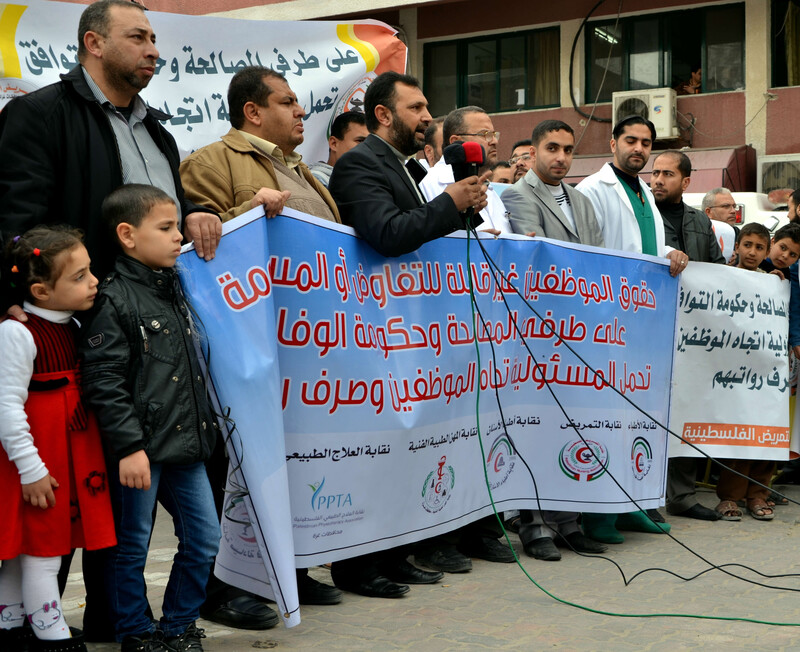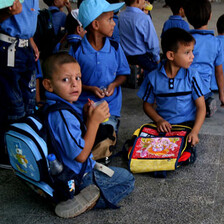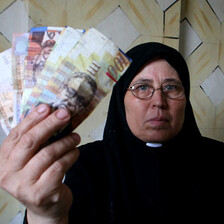The Electronic Intifada Gaza Strip 29 January 2015

Palestinian doctors and healthcare workers hold a protest to demand their salaries in front of Nasser Hospital in Khan Younis on 26 January.
Abdallah al-Hourani has been forced to make the kind of decisions that parents dread.
Receiving no wages for the past seven months, he has stopped paying tuition fees for two of his children who are attending university. Of his many debts, he owes nearly $2,000 for basic groceries, a considerable sum given that his monthly salary stood at only $1,000.
Al-Hourani is a nurse in the orthopedics department of Nasser Hospital in the Khan Younis area of Gaza. His problems are shared by around 42,000 of Gaza’s public sector employees. All of them are being denied wages because of circumstances beyond their control.
In April last year, the Palestinians’ two main political parties, Fatah and Hamas, signed a “national unity” agreement. Although it was supposed to end the divisions between the Palestinians’ representatives, many aspects of it were vague — including the question of salaries for those employed in the public sector.
Workers have been left in the lurch as a consequence.
That al-Hourani has served his people selflessly is beyond dispute. When Israel bombed Gaza for 51 days last summer, he cared for the injured and dying, despite having no idea when his paycheck would arrive. He had to brave Israeli bomb attacks while traveling by ambulance from his home in the city of Rafah to Khan Younis.
Some 23 health workers died as a direct result of the Israeli attack, 16 of them while on duty. Another 83 were injured, “the majority of whom were ambulance drivers for the various pre-hospital emergency service providers,” according to an independent medical fact-finding report.
“Once I stayed [in the hospital] for 72 hours continuously, working under pressure,” al-Hourani said. “It was a very big responsibility.”
“Unbearable”
The only time that al-Hourani has been paid in the past seven months was when he received a $1,200 grant from Qatar in the fall. He used the sum to buy a second-hand computer. “I can tell you that things have never been worse since I was recruited as a nurse in 1994,” he said. “The strain is unbearable.”
This is by no means the first time that Gaza’s workers have not been paid. After Hamas took over administration of Gaza in 2007, the Fatah-run Palestinian Authority in the occupied West Bank stopped transferring money for salaries to Gaza.
The Hamas-led authorities in Gaza have been providing employment to about 50,000 public sector employees.
Al-Hourani has often struggled to provide for his family. On one occasion, his then-pregnant wife miscarried at their home in the Yebna refugee camp in Rafah. He could not afford to bring her to the hospital.
“Dying slowly”
“I felt a great deal of bitterness,” he said. “Our human dignity is being stripped. We are dying slowly.”
The funding crisis has had a marked effect on Nasser Hospital. Dr. Adnan al-Zatma, head of its surgery department, said that half of his staff have not been paid since last June. “We have had to delay many operations,” he added.
The non-payment of salaries has led to strikes and protests. Many of Gaza’s workers have voiced their displeasure at how Mahmoud Abbas, the Palestinian Authority leader, recently traveled to Paris for a march honoring those killed at the offices of the satirical paper Charlie Hebdo at a time when his own people are struggling to cope.
Sami al-Amasi, head of the Palestinian General Federation of Trade Unions in Gaza, said that Abbas has the power to order that salaries be paid “immediately.”
Last week, workers surrounded the Gaza offices of the Palestinian unity government. Some of its ministers were effectively locked into the building for much of the day.
Rami Almeghari is a journalist and university lecturer based in the Gaza Strip.





